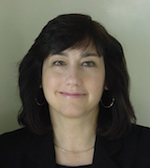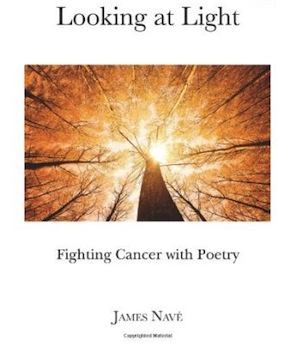
Author: James Navé
Publisher: Imaginative Storm Publications, 2012
Information: ISBN: 9780985752811 | $12.99 US


Somewhere in the middle of reading Looking at Light, a vivid moment from a cancer support group meeting plays back in my head, almost like a scene from a movie. Picture this: a woman sitting in a circle of breast cancer survivors asking the group, somewhat impatiently, when will I feel like ‘me‘ again?
Good question. How long does it take to heal from cancer treatment? Maybe even more importantly, who do you talk to about recovery issues? Whose input might be most helpful to you?
Doctors and nurses? That’s one option. Clinicians have a distinct point of view, but their perspective might be limited to the physiological aspects. And unfortunately, sometimes their answers to your questions are delivered along with that infamous caveat, “of course, every patient’s different…”
Fellow cancer patients? Another possibility. Many cancer survivors proudly share their personal recovery stories with one another, including the lessons they’ve learned along the way. This is one way veteran survivors help newbies navigate a path to a “new normal” after their surgery, chemotherapy and radiation treatments have ended.
Now consider the talents poets recovering from cancer treatment have to offer their fellow cancer survivors. Poets are gifted wordsmiths with the power to keenly observe the world around them. Next, they magically transform firsthand experience into vivid word pictures that resonate with layers of meaning. What can I say? I’m totally in touch with my bias; and, yes, the poet wins, hands down, every time! I can’t think of a better way to make a case today for adding Looking at Light to the CancerLand Bookshelf. James Navé is both a poet and a cancer survivor. He “gets” it; he really does. And in my humble opinion, that is our collective good fortune.
Navé’s 100 poems – written one a day, following surgery for prostate cancer – supply answers to questions about recovery and healing from cancer, insights that are revealed in subtle fashion, one memorable poem after another; just keep turning the pages, my friends.
Looking at Light begins with his observations and thoughts, waking up in a hospital bed after surgery: (I am still whole, so little has gone from my body. Sitting up after going in and out of who I am…Thirsty. Crunched ice between my teeth.)
The poet explains in the author’s note that each poem originally appeared with classic stanzas and line breaks. However, during the revision process, Navé decided to change to a prose format. As a result, each piece has the look and feel of a daily journal entry, only far more polished and poetic.
In poetry and memoir, cancer is often described as a journey. The organization of Looking at Light explores that notion quite literally with the author traveling to five different places in North Carolina, followed by side trips to New Mexico and New York City. Navé’s collection of poems is numbered, arranged chronologically and grouped according to locale.
In fact, to heighten that sense of journey, I highly recommend reading the entire book in one sitting. By the last page, the anthology becomes a poetic flipbook of sorts, reminiscent of what you might recall from childhood. Instead of simple cartoon drawings on each page, there’s a connected flow of word pictures, experiences and feelings. Flipping through the pages creates a sense of motion, a subtle forward momentum. Healing from cancer is a lot like that.
Navé’s writing describes in detail the people, places and things around him as he travels from place to place on a path to recovery. But thoughts about cancer reappear with regularity, before and after the vivid descriptions of his surroundings, both rural and urban. Cancer survivors can testify that treatment changes your world, often bringing it to a screeching halt. The good news is that sometimes, in the stillness that follows, there’s an opportunity to tune into your surroundings in a new way, through different lenses, at a slower speed. Maybe that’s why I was so moved by poem three in the anthology, Navé writes:
I haven’t walked much since I got here. When I do, I travel 10,000 miles with each step – a new kind of speed. Now I have time to think, hum, and watch the buds bloom up the ridge.
Recovery is also a time to appreciate some of those things that we ordinarily take for granted. Isn’t one of life’s simplest pleasures a long, hot shower? After surgery, that first shower is a significant rite of passage, with water flowing over a body newly altered and fragile in places:
Just after breakfast, I showered for the first time since my surgery. Hot water ran across my shoulders, down my spine, my arms, my chest, my stomach, the thirteen faithful staples below my belly button, my legs, over my feet, between my toes and into the drain.
Beyond his awareness of the physical changes to his body, Navé is also sensitive to the impact of a cancer diagnosis on his identity and sense of self. In poem 72, he writes:
I know what it’s like when the blade comes and takes what it wants and leaves the rest. I know what it’s like when the room is cold and the gloved hand cradles the unrotten in me. I know what it’s like to tumble from the sky and forget, for a moment, who I am.
Part of recovery, the poet suggests, is making sense of the changes that occur physically, emotionally and spiritually. No one travels in CancerLand and emerges unscathed. The journey leaves marks. (Who I was then is not who I am now, nor who I will be tomorrow, or a year from now…).
In poem 81, Navé continues to explore the impact of cancer with a refrain that resonates:
What I’ve seen, I have become, andwhat I’ve become, I have kept, and what I’ve kept is mine forever…
Then as the collection concludes, a pair of poems ostensibly about catching and releasing rainbow trout in a stream, instead offers real insights about how to heal from cancer treatment:
Wet your hands, take yourself to the shallows, hold yourself gently in the easy flow. Move back and forth, nose to tail, until three bubbles of air emerge and you regain your strength, then finally, as if you were your own child, release yourself back into the unreachable depth and velocity of the breaching stream.
Without a doubt, survivors who have completed cancer treatment and are ready to jumpstart their lives again will see pieces and parts of their experience reflected in these one hundred poems. And come away from reading Looking at Light with the sense that they are not alone in their feelings about the challenges of recovery from cancer.
